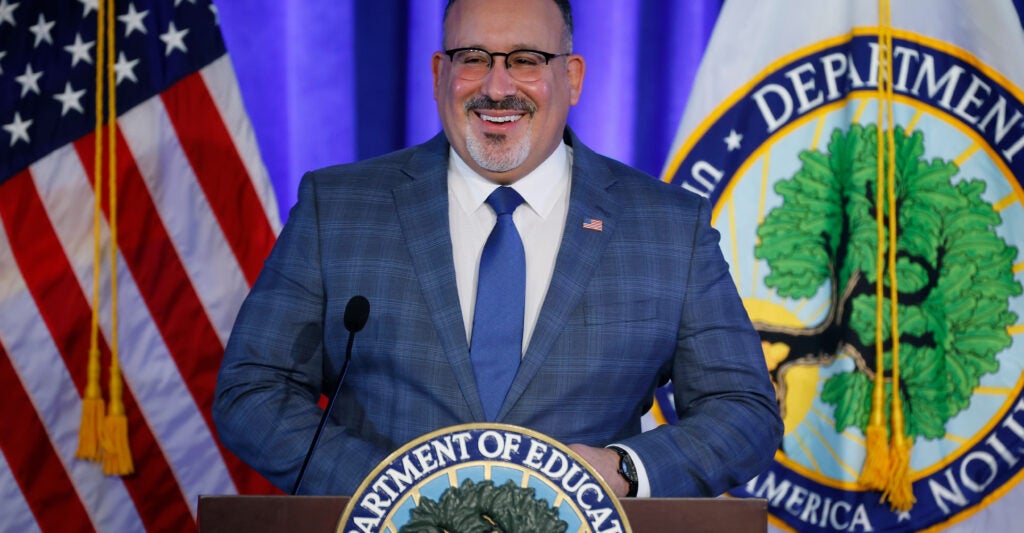A congressional committee’s recent vote should be a message to taxpayers: Yes, it is possible to close the U.S. Department of Education.
The House Appropriations Committee approved a proposal to cut an entire program from the agency, demonstrating how lawmakers can downsize and then eliminate the department.
The Appropriations Committee voted to defund Title II, Part A of the Elementary and Secondary Education Act, the federal law governing K-12 schools. The proposal now goes to the full U.S. House.
This specific title directs federal spending on teacher professional development and recruiting, which sound like worthwhile initiatives—except that these programs have failed for years to help teachers and students.
Just ask advocates of Title II, Part A about professional development.
In 2015, The New Teacher Project tried to uncover what, exactly, would be “the right type and right amount of support” for teacher training and improvement. They cited two federally funded studies of “sustained” professional development and “found that these interventions did not result in long-lasting, significant changes in teacher practice or student outcomes.”
The report adds that “if teacher improvement were achieved at scale, it would have an enormous effect on students. The problem is our indifference to its impact—that all this help doesn’t appear to be helping all that much.”
It only gets worse for professional development. Researchers at the Learning Policy Institute wrote, “Research has shown that many [professional development] initiatives appear ineffective in supporting changes in teacher practices and student learning.”
Though the Learning Policy Institute found some research examples demonstrating that teacher training has “a positive link” with improved student outcomes, the researchers still said “major questions remain about how teachers can learn these [effective teaching] skills and how [professional development] can play a role in improving teacher practice.”
An American Institutes for Research report said, “13 years and some $30 billion later, Title IIA has not had the effect on teacher and principal quality or student achievement its creators hoped.”
The National Council on Teacher Quality, the Graduate School of Education at the University of Pennsylvania, and the Association for Supervision and Curriculum Development have issued similar reports that include statements critical of professional development, while maintaining that it can be reformed.
The Learning Policy Institute, the American Institutes for Research, and others say that even though federal taxpayer spending on teacher training has not produced the intended results, we need more of it.
Americans should note when education organizations call for lifelines for failing programs while lawmakers expose weaknesses. This combination means the reasons for closing the Education Department continue to mount.
Courts have found that two of President Joe Biden’s administration’s signature education plans are illegal. The administration tried to shift outstanding college student loan payments from students to taxpayers, but federal courts have enjoined many of those efforts. The plan would force taxpayers to pay for outstanding loans, an affront to those who worked and saved to pay off their own student loans.
Biden’s team is also trying to redefine sex to mean “gender” in federal civil rights law, and this move, too, is facing injunctions across much of the country. By redefining sex in this way, boys would have access to girls’ private spaces in K-12 schools and be able to participate in girls’ athletics. Surveys consistently find these ideas are highly unpopular.
Meanwhile, achievement gaps persist between students from families with different income levels, reading and math scores are stubbornly low, and education spending is high.
The agency has not had answers for these problems since its inception.
So, when Congress points to evidence that a large federal education program is ineffective—taxpayers spend $2.19 billion on Title II-A annually—these findings, along with the Biden administration’s illegal activities, only strengthen the position that lawmakers should close the whole department.
The House Appropriations Committee just demonstrated how to close the agency. Report that a program is ineffectual and zero-out the budget for it. For programs that make public education activities more transparent, relocate offices to departments where they would be better suited.
Repeat this process across the department. The findings will give parents and local educators confidence that Washington is ready to stop spending money to prop up programs that fail both teachers and students.
